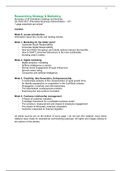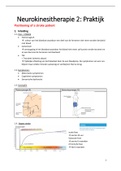1
Researching Strategy & Marketing
Summary of all mandatory readings and lectures.
Q2 2020-2021 (Premaster Business Administration – UT)
1 page essentials per article!
Content:
Week 0: course introduction
Information about the course and reading articles.
Week 1: Marketing for the better world
- Corporate Social Responsibility
- Corporate Digital Responsibility
- How and When Grouping Low-Calorie options reduces the benefits…
- How to SHIFT consumer behaviours to be more sustainable.
- Knowing what it makes.
Week 2: Digital marketing
- Digital analytics: modelling
- Artificial intelligence in service
- Driving brand engagement through influencers
- Service robots rising
- Consumers and artificial intelligence
Week 3: Creativity, Idea Generation, Entrepreneurship
- A multivariate analysis of the characteristics of rapid growth firms
- An Identity perspective on coopetition in the Craft Beer industry
- Propagators, Creativity and informativeness
- The downstream consequences problem
- Examining the new product innovation
Week 4: Customer relationship management
- A theory of customer valuation
- A strategic framework for a profitable business model
- The construct, measurement and impact of employee engagement
- The impact of third-party customer acquisition
- Customer responses to channel migration
All article sources are on the bottom of every page. I do not own this material, many direct
citations were made for educational summarizing purposes. All rights and images belong to
the authors of the articles.
, 2
Week 1: Marketing for the better world1
1. Corporate social activism (updated)
This article is about corporate social activism: firms that show their values by giving public
support for (or opposition to) a particular social issue. The authors have analyzed 293 CSA
events by 149 firms, so the research method was a sort of document analysis.
Corporate social activism is in particular important to customers and other stakeholders. It is
not that important to investors themselves, but customers will focus on societal issues and
thus so will investors.
Research questions
1) How do investors react to CSA events?
2) How does the degree of deviation of CSA from the values held by customers,
employees, state legislators and the firm’s brand image modify investor’s reactions to
CSA?
3) How do characteristics of CSA resource implementation modify investor’s reactions?
4) How do customers respond to CSA?
Conceptual model – Corporate social responsibility, corporate social activism and
corporate political activism
(Bhagwat et al, 2020)
Conceptual model (Bhagwat et al, 2020)
The authors have created a model from the outcomes of their document analysis. This could
be seen as a regression equation. (Political) ideals of the customer should be in line with the
company’s in order to have a positive CSA effect. This is very important.
Conclusion
In the short term, CSA evokes abnormal stock returns. But in the long term, customers might
react positively and increase purchasing according to their political ideals. Companies and
managers should look critically into the decision of participating in CSA.
1
Bhagwat Y, Warren NL, Beck JT, Watson GF. Corporate Sociopolitical Activism and Firm Value.
Journal of Marketing. 2020;84(5):1-21. (UPDATED)
, 3
2. Corporate digital responsibility.2
The second article is about Corporate Digital Responsibility (CDR). CDR is defined by the
authors as the set of norms and values that guide organizational operations (regarding to
four main processes related to digital technology and data).
Research objectives:
1. What is CDR and how to conceptualize it?
2. Differentiating CDR from CSR (corporate social responsibility, article 1)
CDR and CSR share some things in common. However, the article argues explicitly that
these concepts should be seen apart from each other. But they do complement each other.
The role and relevance of CDR in different Business Administration principles.
- Marketing management
o E.g. balancing organizational data needs and privacy failures related to
hacking and data leaks
- Consumer behaviour, consumer psychology
o Privacy concerns, customization
- Human-computer interaction
o Social robots
- (Computer) ethics
o Consumer data protection laws
o Privacy policies
- System design
o Specific norms to guide system design
o Ethical aspects of technology development and technology usage
- Design research, sustainability research
o Stating technology’s influence on users in design
Stakeholders in CDR:
- Individual actors
- Organizations
- Artificial / Technological actors
- Institutional / Governmental / Legal actors
Conceptual framework that is proposed in the article. (Lobschat et al, 2019)
2
Lobschat, L., Mueller, B., Eggers, F., Brandimarte, L., Diefenbach, S., Kroschke, M., & Wirtz, J.
(2019). Corporate Digital Responsibility. Journal of Business Research, (July 2018), 1–14.





